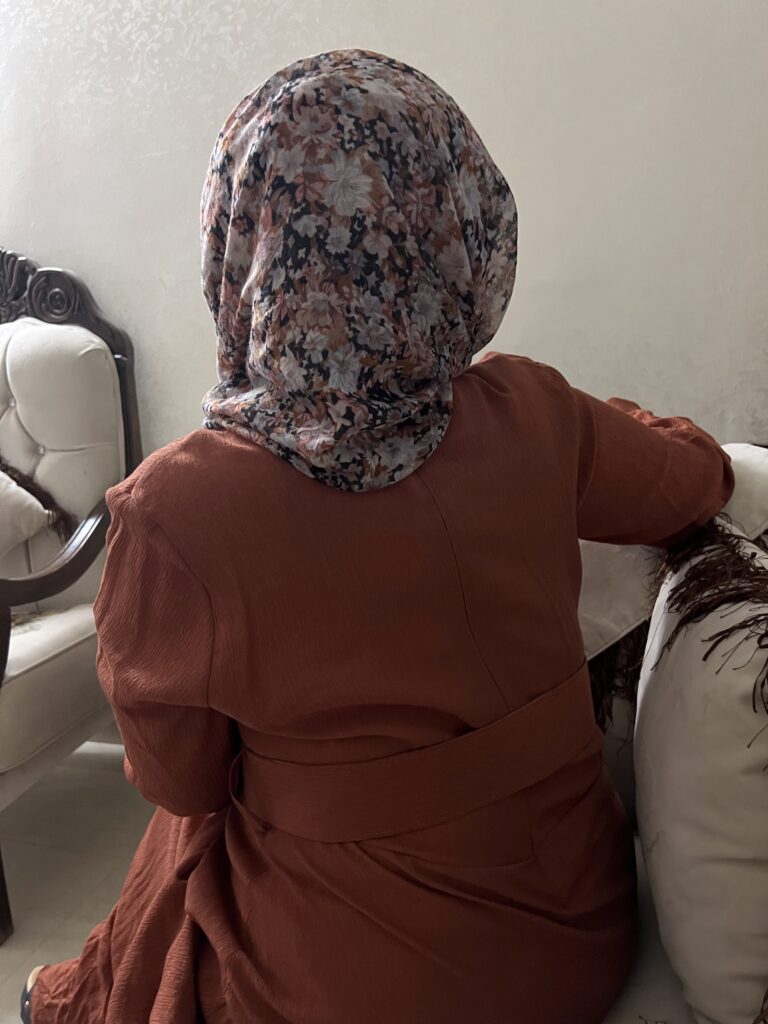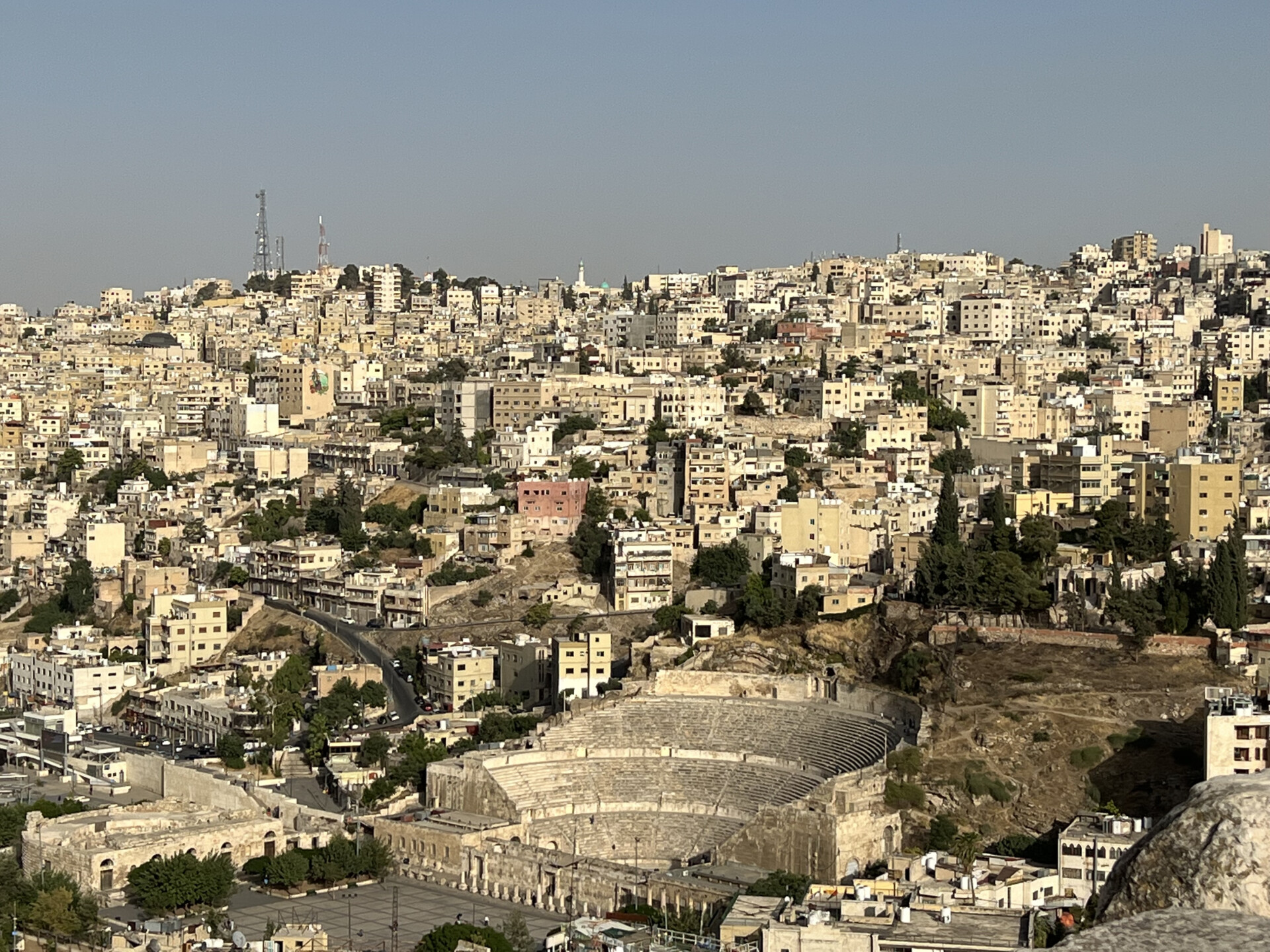Amal watches her children play on the living room floor of her house on a quiet street in a suburb of Jordan’s capital. As dusk settles over the sloping hills of Amman, she sinks into a sofa and lights a cigarette, adjusting her hijab.
“It is illegal, but you can’t know how I feel,” she says. “I couldn’t think of anything except getting rid of this pregnancy. Even my kids — I couldn’t think of them. And I knew I had to make a decision.”
A few years earlier, Amal had everything under control. After over a decade of insisting she would not marry, she had married a man of her choosing, and they soon happily welcomed two babies. Amal, now in her 40s, continued working and began saving money so that her children could have the same university education that she had enjoyed.
But then she became pregnant a third time, three months after giving birth to her second child. Her husband wanted the baby, but she did not, worrying she would not be able to support another child financially. She wanted an abortion, but as a Jordanian woman that meant seeking out a medically risky procedure and facing possible incarceration for her actions. Her husband did not support her seeking to terminate the pregnancy, but he did not prevent her either.
Abortion is illegal in Jordan except in cases where the mother’s physical or mental health is seriously at risk. Any woman who undergoes an abortion, as well as the person or doctor who performs the abortion, can face a prison sentence of up to three years (or more, in the case of medical professionals). To get an abortion legally, a report must be made in advance of the procedure and signed off on by two doctors as well as the woman seeking the abortion and her husband or guardian. There is no exception for rape and incest.
But this strict ban is butting up against an increasingly urbanized population seeking autonomy, as well as an economic climate that has left many Jordanian women wanting to protect their financial stability and reproductive choices.
Amal decided to end her pregnancy even though she understood the stigma. At first she tried herbal remedies, but when these failed she sought medical help. Her personal doctor refused, but a second doctor agreed. Amal drove alone through the desert for an hour to reach the clinic. She chokes up remembering the procedure — performed without anesthetic — in a dirty rural medical office. Afterward, she smoked to calm herself and drove home still bleeding. Once home, she told her husband.
Access to abortion in Jordan teeters between socially unacceptable and reluctantly acknowledged. In a private clinic nestled between embassies’ high walls, spilling over with bougainvillea, Dr. Svetlana Golovko, a urogynecologist, counsels many women about family planning. She prescribes birth control and is thankful for the internet resources increasingly available to her patients, but she does not condone abortion. “Jordan is a very small country; if something happens, it’s public,” she says, arguing that women need to “think twice,” as “they could really harm themselves, their reputation and their family’s reputation.”
Though less well known than its Saudi Arabian counterpart, Jordan has its own version of the guardianship system that ties women’s actions to their male relatives’ whims. Jordanian women have some of the highest education levels in the Middle East and North Africa, with more women attending university than men. Reproductive rights, however, remain taboo. The only options for most women seeking to terminate a pregnancy are unlicensed clinics or illegal abortion-inducing medications such as mifepristone and misoprostol — known in Jordan by its brand name Cytotec. These often arrive illicitly from Egypt, Lebanon and Syria and are sold under the counter at pharmacies or on the street.
Unlike in Syria or Lebanon, where misoprostol — a medication conventionally used to treat ulcers — is readily available at pharmacies, in Jordan, many pharmacies do not sell the drug. And while in Egypt there is an active black market for selling both mifepristone and misoprostol, accessing these medications in Jordan is difficult and supply is unreliable.
Nour Saadi is a Syrian-trained doctor now based in the Netherlands who works for Women on Web — a nonprofit organization supporting worldwide access to safe abortion medications for first-trimester abortions. Saadi offers guidance for at-home, medically induced abortions, handling Arabic queries, for which the organization also runs an Arabic Facebook page. The page helps to improve access in countries where their site is blocked, such as Saudi Arabia. Saadi notes that Women on Web gets very few requests for help from women in Jordan. “Jordan is more conservative than Syria,” she says. “It’s a closed society, with conservative people, and they know each other.”
Access to abortion varies across Arab and predominantly Muslim countries. The issue is not directly addressed in the Quran, allowing for different interpretations of its permissibility. Early-term abortions are generally seen as permitted if the mother’s life is in danger.
Recent data indicates that Jordanian women are having fewer children. The country’s fertility rate fell from 3.5 children per woman in 2012 to 2.6 in 2023, according to the Jordan Population and Family Health Survey. The 2023 survey also found that 60% of married women were using a method of family planning. And there is an increase in contraception use — both traditional and medical — among Jordanian women, with 46% usage for women with no education and 62% usage among those with secondary school or higher degrees.
In 2014, Jordan’s Iftaa Department issued a fatwa (religious edict) condemning rape and incest as a violation of Islam and asking women who had been victims to notify the department so that their cases could be examined and other, case-specific fatwas could potentially be issued to their benefit. One possible interpretation of the edict had been that the government intended to grant case-by-case permission for abortion in these circumstances. The fatwa, however, was a guideline and not legally binding. Activists have been calling for abortion laws to include rape and incest exceptions ever since the fatwa was issued, but to no avail.
Women’s rights activist Nuha Muhreiz states that abortion is “easier now” in Jordan than it had been previously. “You can find unsafe abortion everywhere,” she says. But she still asserts that anyone who champions abortion rights will face challenges from secular and religious communities alike. Private discussions are acceptable, but public advocacy is not. The Jordanian Health Ministry was contacted for comment during the writing of this article but did not respond.

Since abortion in Jordan is often handled clandestinely, however, statistics on it are unreliable. “There is always a dark number that we cannot know regarding the number of cases because most of them are carried out secretly,” says Inaam al-Asha, a lawyer and executive director of Solidarity Is Global Institute, a nongovernmental organization that supports Jordanian women’s rights. The institute reports that 49 women were incarcerated for their abortions between 2009 and 2016, citing figures from the Ministry of Justice, while according to U.N. data, there were 26 allegations of abortions filed with authorities in 2022. Contraceptives are accessible in pharmacies and free of charge in public clinics, but only 38% of married women aged 15 to 49 use medical contraception such as intrauterine devices, condoms and the pill. Emergency contraception is illegal.
Saadi says that while she believes Jordanian women will continue finding ways to have abortions, she doubts that legal reforms will happen soon. “Very few have an open mind about abortion policy,” Saadi says. “The first thought that comes to the mind or to the tongue is ‘haram’ — I’m not allowed because of religion. That’s why I believe it will take much more time.”
Another young woman, known as Meera (she requested that a pseudonym be used), is intimately familiar with the stigma surrounding abortion in her home country. In 2007, when Meera was in her 20s, she discovered she was 10 weeks pregnant. It was a very precarious situation, as sex outside of marriage is illegal. Meera and her boyfriend paid a doctor 1,000 dinars ($1,410) for a clinic abortion performed without anesthetic.
“It was sad,” Meera says. “I wished at that time that I wasn’t born here, that I wouldn’t be labeled, wouldn’t be judged. It wasn’t an easy decision and I always felt bad.” Several years later, Meera did have a child, but that too was an unplanned pregnancy, except this time she opted to marry her new partner. “It was nice of him, actually. He was like: ‘Let’s get married. I won’t ditch you.’”
Meera narrowly avoided running afoul of Jordan’s Crime Prevention Law. Hundreds of women are detained each year, as the law allows authorities to arrest individuals deemed “a danger to the people.” These detentions are without charge or trial and can last from weeks to years. At times, women are imprisoned ostensibly for their own protection — if, for instance, there is a perceived threat of violence from a family member. Often, however, women are detained for so-called “immoral behavior,” such as being absent from home without their guardians’ permission or having sex outside marriage.
While the Crime Prevention Law detentions are separate from the criminal offense of performing an abortion, both demonstrate the complexity of Jordanian women’s legal standing within the country. There are other examples, too. Jordanian women who have children with non-Jordanian men cannot pass their citizenship to their children — a situation that is not the case for Jordanian men with foreign spouses. Women under the age of 30 require their male guardian’s permission to marry, and families can use the crime prevention legislation to have their unmarried pregnant relatives incarcerated and their child, once born, taken into state care. Jordanian women are making decisions about abortion against the backdrop of this extensive legal and social framework.
In 2023, the World Bank downgraded Jordan from an upper-middle-income to a lower-middle-income country. The economy continues to falter, with high inflation and a weak labor market. This economic instability adds another layer of complexity to family planning.
Yet Jordanian women are trying to assert their right to control their futures. Sipping tea as her children giggle and crawl in and out of her lap, Amal says she is a feminist in a patriarchal society. Being a working mother of two children is demanding, and the extra attention and economic stress of a third felt like too much. Her feminism encompasses her body and finances. “It is a miserable life if you are not financially independent as a woman,” she says. Her husband did not support her abortion, and he did not pay for it. Amal’s abortion cost her 3,000 dinars ($4,230) and fortunately, thanks to her career, she could afford it. “I don’t regret it,” she says.
“Spotlight” is a newsletter about underreported cultural trends and news from around the world, emailed to subscribers twice a week. Sign up here.



